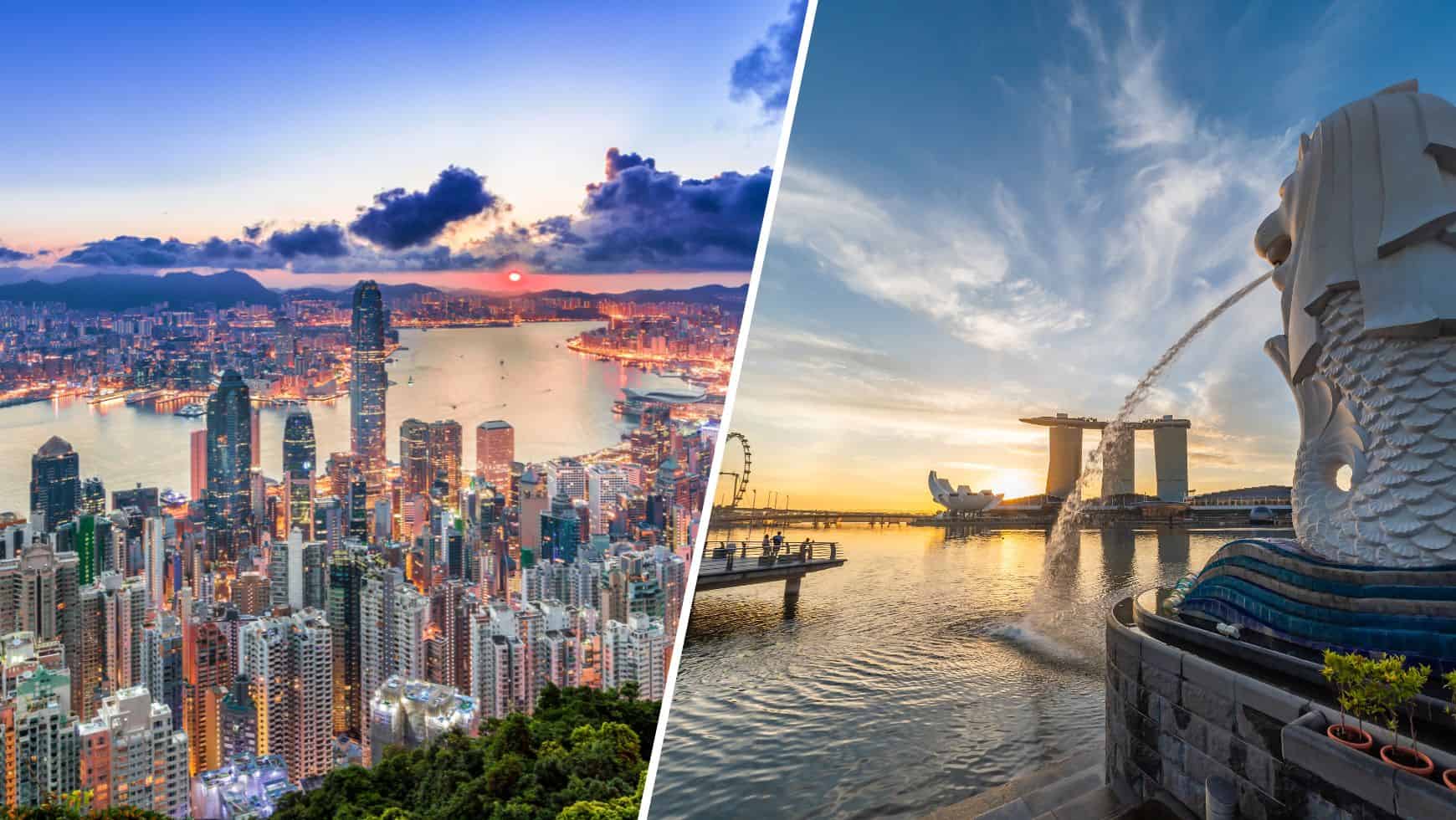Doing business in Asia: Hong Kong versus Singapore
When it comes to choosing the best place to establish or expand a business in Asia, the debate often boils down to Hong Kong versus Singapore.
As two of the most prominent financial and trade hubs in the region, they attract entrepreneurs, multinational corporations, and investors seeking opportunities in Asia’s dynamic markets.
This guide provides an in-depth analysis of key factors to consider when comparing Hong Kong and Singapore as business destinations. Understanding the strengths of each city will be crucial for your business success.
1. Economic Environment
Hong Kong:
Hong Kong operates one of the world’s most open and free economies. As a Special Administrative Region (SAR) of China, it acts as a gateway for businesses seeking access to the vast Chinese market.
The financial services sector is a cornerstone of its economy, accounting for over 20% of GDP, with Hong Kong being home to one of the largest stock exchanges globally.
Its economy thrives on trade, professional services, and logistics, with a business-friendly tax system further enhancing its competitiveness.
While geopolitical considerations have introduced certain uncertainties into the local economy, the framework for doing business has remained the same.
Singapore:
Singapore’s economy is characterized by stability and diversification.
Known for its prowess in innovation, the city-state excels in financial services, high-tech manufacturing, biotechnology, and logistics.
Singapore’s strategic location in Southeast Asia positions it as a hub for companies targeting ASEAN markets.
With strong government support and comprehensive economic policies, Singapore has consistently ranked as one of the most competitive economies globally. While its cost of living and business expenses are relatively high, the efficiency and predictability of its economy mitigate these concerns.
Conclusion:
Hong Kong’s strength lies in its gateway access to China and its trade-oriented economy, while Singapore offers a diversified, innovation-driven economy with regional reach.
2. Infrastructure and Location
Hong Kong:
Hong Kong is renowned for its world-class infrastructure, including an international airport ranked among the best globally and a top-tier container port.
It boasts unparalleled connectivity to mainland China via high-speed rail and robust air and sea freight networks.
Its compact size ensures efficient transportation within the city, for both private transport as well as an extensive, efficient public transportation system.
Its strategic location at the heart of Asia makes it an ideal hub for regional trade and logistics.
Singapore:
Singapore’s infrastructure is equally impressive, with an award-winning airport (Changi Airport) and a highly efficient seaport that ranks among the busiest globally.
Its position at the crossroads of major shipping lanes enhances its reputation as a maritime and logistics hub.
In addition, Singapore has invested heavily in smart city initiatives, offering seamless public transportation and advanced digital infrastructure that supports a thriving business ecosystem.
Conclusion:
Hong Kong and Singapore both have world-class infrastructure that supports global businesses. Hong Kong stands out with its top-tier airport and busy container port, making it a hub for trade and logistics in North and East Asia. Its free-port status allows goods to move quickly, and its close ties to mainland China give businesses easy access to this massive market.
Singapore, meanwhile, shines as a leader in transportation and digital innovation. Its location at the heart of major shipping routes makes it perfect for businesses targeting Southeast Asia and global markets. On top of that, Singapore’s advanced digital infrastructure and smart city projects make it a top choice for industries like e-commerce, fintech, and smart logistics.
Hong Kong is ideal for businesses focused on fast logistics and North Asia, while Singapore offers excellent digital systems and connectivity to Southeast Asia. The choice depends on your business needs and market goals.
3. Business Incorporation
Hong Kong:
Setting up a business in Hong Kong is quick and simple, with the entire process usually taking about one to two days (for online application). The Companies Registry provides a user-friendly online platform, making registration hassle-free.
Foreign investors can own 100% of a company, with no need to appoint local directors or shareholders and without minimum capital requirement in general, offering great flexibility for international entrepreneurs. Having said that, a Hong Kong company is required to have at least one personal director.
To incorporate a private limited company, you’ll need to choose a company name, decide on the structure, appoint director(s) and have shareholder(s), and prepare the company’s Articles of Association.
Once the incorporation documents are ready, they can be submitted online to the Companies Registry for approval.
As a foreigner, you will need some basic documents to get started mainly for due diligence purposes, including copies of passports or ID cards for all directors and shareholders, proof of residential addresses, and bank reference letters. If these documents are issued outside Hong Kong, they are potentially required to be certified as true by professionals.
Singapore:
Incorporating a business in Singapore is also fast and efficient, usually completed within one to two days. The Accounting and Corporate Regulatory Authority (ACRA) offers an online platform, BizFile+, which streamlines the process for business owners.
Foreign entrepreneurs can own 100% of their company, but Singapore requires at least one local director who must be a Singaporean citizen, Singaporean permanent resident, or holder of an EntrePass or Employment Pass (work visa).
The process begins with choosing a unique company name and appointing director(s) and shareholder(s). Entrepreneurs then draft the company’s constitution and submit the incorporation documents through the ACRA portal. This digital system makes registration convenient and accessible.
To set up a private limited company, you’ll need to provide key documents, including a copy of each director’s and shareholder’s passport, proof of residential address, and a bank reference letter. In addition, you must appoint a Singapore resident director, whose identification and address details are required to complete the process.
Conclusion:
Both cities make incorporation easy, but Hong Kong’s lack of a local director requirement offers additional flexibility to foreign investors.
4. Ease of Doing Business
Hong Kong:
Hong Kong consistently ranks in the top 3 of the Ease of Doing Business index. It offers minimal bureaucracy, efficient legal systems, and pro-business policies. Its simple tax framework, lack of exchange controls, and free-market principles contribute to its reputation as a top business hub.
Singapore:
Singapore has also consistently ranked as one of the world’s easiest places to do business, thanks to a corruption-free government, efficient regulatory framework, and a supportive ecosystem for start-ups. Its strong intellectual property protections and digital infrastructure further facilitate smooth business operations.
Conclusion:
Singapore and Hong Kong both excel in making business operations simple and transparent. Their streamlined processes and comprehensive support systems make them equally compelling for global companies.
5. Banking Infrastructure
A strong banking infrastructure is critical for businesses to operate efficiently, and both Hong Kong and Singapore deliver world-class financial services tailored to global markets.
Hong Kong:
Hong Kong is a global financial powerhouse, hosting over 70 of the world’s largest banks. Its banking industry is backed by a robust regulatory framework overseen by the Hong Kong Monetary Authority (HKMA), which ensures financial stability and safeguards the system’s integrity.
Hong Kong’s banks specialize in international banking, trade finance, and wealth management, making the city an excellent choice for multinational businesses engaged in global trade.
Corporate banking in Hong Kong focuses heavily on facilitating international transactions and supporting cross-border business operations.
However, opening a corporate bank account is sometimes not straightforward due to strict Anti-Money Laundering (AML) requirements. Banks often require detailed documentation and in-person visits for verification, adding some procedural hurdles.
Singapore:
Singapore is another top-tier financial hub, renowned for its innovation and stability. The city’s banks are technologically advanced, offering digital-first solutions that cater to modern business needs.
Singapore has also emerged as a leading hub for fintech, with strong government support for blockchain, digital payments, and other innovative technologies.
The Monetary Authority of Singapore (MAS) oversees the banking sector, ensuring a secure and compliant financial environment. Singapore’s banking infrastructure provides diverse services, including trade finance, venture capital, and traditional loans.
Opening a corporate bank account is also not straightforward under certain circumstances. Digital banks and fintech-friendly institutions might be an option for maintaining a bank account, in particular for crypto-related business. While in-person verification is still standard, the process tends to be smoother and quicker.
Conclusion:
Hong Kong’s banking sector stands out for its focus on international trade and wealth management, while Singapore excels in innovation and fintech.
Businesses involved in global trade may benefit from Hong Kong’s expertise in trade finance, whereas those seeking cutting-edge digital banking solutions may find Singapore more attractive.
6. Corporate Taxation Framework
Hong Kong:
Hong Kong operates a territorial tax system, meaning only income earned within the city is subject to tax under the general provisions of the tax laws.
Its two-tier corporate tax regime is both simple and attractive, with a flat profits tax rate of 16.5% for corporations and 15% for unincorporated businesses. For the first HKD 2 million in profits, the tax rate is halved to 8.25% for corporations and 7.5% for unincorporated entities, provided that certain conditions can be met.
A key advantage of Hong Kong’s system is its 0% tax on profits earned from business conducted outside of Hong Kong (i.e. no taxation on foreign/offshore sourced profits), unless the Foreign Sourced Income Exemption (FSIE) Regime is applied on certain passive foreign sourced income.
To encourage certain industries and businesses to set up, such as R&D, family office, funds, corporate treasury, ship and aircraft leasing, Hong Kong has introduced tax incentives and concession measures to attract investors.
Adding to its appeal, Hong Kong does not impose VAT/GST, or capital gains tax. This simplicity reduces compliance costs and makes financial planning easier for businesses. Its straightforward tax filing system is a further benefit, ensuring minimal administrative burden for companies.
Singapore:
A company resident in Singapore shall be subject to the Singaporean corporate income tax on any income accruing in or derived from Singapore, or received in Singapore from outside of Singapore.
Singapore’s corporate tax regime is capped at a flat rate of 17%, and the city-state also offers a variety of incentives and exemptions that can significantly reduce the effective tax rate.
These include the Startup Tax Exemption Scheme, which provides a 75% tax exemption on the first S$100,000 of normal chargeable income for qualifying companies during their first 3 years, and a 50% exemption on the next S$100,000.
Additional tax incentives encourage R&D activities, intellectual property registration, and other business investments.
Same as Hong Kong, Singapore does not impose tax on capital gain in general, and introduces the FSIE Regime on certain passive income. Comparatively, it appears that taxpayers, in particular SME entities, in Hong Kong have more flexibility for not falling into the FSIE Regime when compared to the taxpayers in Singapore.
Unlike Hong Kong, Singapore imposes a Goods and Services Tax (GST), which currently stands at 9%. While this introduces an extra layer of complexity, Singapore’s incentives often offset these costs, making it highly attractive for startups and innovative businesses.
Conclusion:
Both Hong Kong and Singapore in general do not impose tax on profits are arising from outside of their jurisdictions under the general rules. However, for Singapore, such foreign profits received in Singapore will be taxable in Singapore.
Hong Kong offers a simpler tax system with no GST and a significant advantage for businesses earning profits outside the city.
Singapore, while having a slightly higher tax rate, compensates with generous tax exemptions and incentives tailored for startups and R&D-focused companies.
Businesses should consider their operational focus and growth plans when choosing between the two jurisdictions.
7. Legal Environment
Hong Kong
Hong Kong’s legal system is rooted in English common law, which fosters a high degree of judicial independence. It provides a stable and transparent legal environment, offering businesses strong protections for intellectual property (IP), including patents, trademarks, and copyrights. This makes Hong Kong a secure base for companies managing valuable IP assets.
For businesses operating across borders, particularly those entering mainland China, Hong Kong serves as a strategic gateway.
However, navigating China-specific regulations requires expert legal advice to ensure compliance. Industry-specific compliance requirements in Hong Kong can vary, but the city’s robust legal framework makes it easier for businesses to adhere to necessary regulations.
Singapore
Singapore’s legal system also follows the English common law tradition and is known for its transparency and judicial independence.
The city-state ranks highly in global indices for contract enforcement and legal integrity, offering businesses confidence in its regulatory environment.
Intellectual property laws in Singapore are among the best globally, with the Intellectual Property Office of Singapore (IPOS) providing efficient IP registration and enforcement processes.
Singapore’s legal framework is streamlined and transparent, making compliance straightforward for most industries. The city-state has also signed multiple international agreements to strengthen IP protection, ensuring businesses with valuable assets feel secure.
Conclusion:
Both Hong Kong and Singapore offer highly reliable legal systems that are ideal for international businesses. Hong Kong is particularly advantageous for companies targeting the Chinese market, while Singapore provides comprehensive IP protection and regulatory clarity for businesses with global operations.
8. Talent Pool
For businesses to thrive and remain competitive in today’s global economy, access to a skilled and diverse workforce is essential. Both Hong Kong and Singapore offer strong talent pools, but each city has unique advantages depending on industry needs.
Hong Kong:
Hong Kong has a skilled, multilingual workforce, with Chinese and English being the primary business languages. It has a strong financial talent pool, though businesses have noted a potential shortage in tech and innovation-related skills. However, graduates are pursuing more engineering and other STEM degrees with support from the local government.
Singapore:
Singapore boasts a highly educated workforce, with a strong emphasis on STEM fields. Its government invests heavily in reskilling programs and attracts global talent through favorable policies. The city is also a hub for tech talent in Southeast Asia.
Conclusion:
Singapore’s workforce is slightly more innovation-focused, especially in tech, while Hong Kong offers a strong base for finance professionals.
9. Visa and Immigration Policies
Hong Kong:
Hong Kong has adopted a “talent attraction” immigration policy for a long time. There is a range of visas available, that are broadly supportive of a business-friendly environment. The visa policies are relatively flexible, allowing entrepreneurs and skilled professionals to apply for work permits with ease.
Read more: A Guide to Hong Kong Visas
Singapore:
Singapore’s immigration policies are designed to attract high-caliber professionals and entrepreneurs. The EntrePass for entrepreneurs and Employment Pass (for skilled workers) schemes facilitate the hiring of foreign talent, but recent tightening of regulations prioritizes local hires.
Conclusion:
Both cities offer attractive visa schemes, but Hong Kong’s policies may be slightly more lenient for global professionals.
10. Quality of Life
Hong Kong
Hong Kong offers a dynamic and fast-paced urban lifestyle, enriched by its cultural diversity. The city is a melting pot of cultures, providing residents with a mix of museums and galleries.
Outdoor enthusiasts can explore scenic hiking trails, beaches, and country parks, while the bustling nightlife and world-class dining scene cater to a variety of tastes.
However, the high cost of living is a notable challenge, particularly when it comes to housing. Accommodation is expensive, and high population density often means smaller living spaces. Despite this, a range of housing options exists, from luxury apartments to more modest accommodations.
Healthcare in Hong Kong is of exceptional quality, with both public and private hospitals offering world-class services. Education is equally robust, with international schools catering to expatriates and excellent public schools for local families.
Singapore
Singapore is consistently ranked as one of the world’s most livable cities, thanks to its cleanliness, safety, and well-maintained infrastructure.
It offers a family-friendly environment, with top-tier healthcare and education systems that appeal to expatriates and locals alike.
Public and private hospitals in Singapore are renowned for their efficiency and high standards, while the city’s education system is globally respected, featuring both international schools and strong local institutions.
Though Singapore also has a high cost of living, the quality of housing is generally excellent. Options range from public Housing Development Board (HDB) flats to luxury condominiums, with government initiatives supporting affordability.
Singapore’s recreational offerings are impressive, featuring cultural festivals, museums, theaters, and a thriving arts scene. The city’s numerous green spaces, such as parks and nature reserves, provide residents with a refreshing escape from urban life. Additionally, Singapore’s tropical climate and diverse culinary scene make it an appealing destination for those seeking a vibrant, multicultural lifestyle.
Conclusion:
Both Hong Kong and Singapore offer exceptional quality of life, but with distinct features. Hong Kong is ideal for those seeking a dynamic cultural scene and easy access to outdoor activities, though its high population density and housing costs may pose challenges.
Singapore excels in safety, family-friendliness, and green spaces, with excellent infrastructure and a slightly more spacious living environment.
Businesses and expatriates should weigh these lifestyle factors alongside their professional goals when choosing between the two cities.
HKWJ Tax Law can help
Hong Kong and Singapore are both world-class destinations for business, and the choice between them ultimately depends on the priorities of the business.
Both cities provide stable, business-friendly environments, ensuring success for companies in diverse industries.
HKWJ Tax Law is present in Hong Kong and Singapore, so our team of experts can provide personalized advice to help you determine the best fit for your needs.
From company incorporation and tax planning to compliance and ongoing support, we offer comprehensive services in both jurisdictions to ensure your business thrives.
Contact us now and let us help you make the most of what these world-class cities have to offer.






